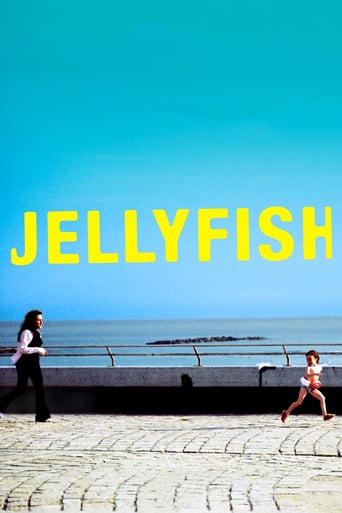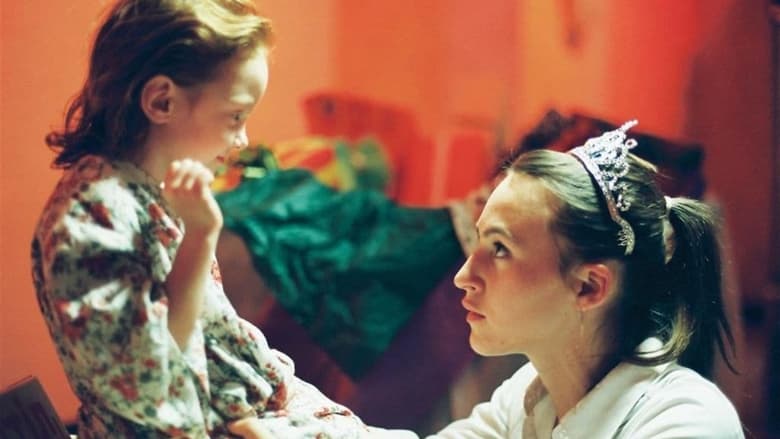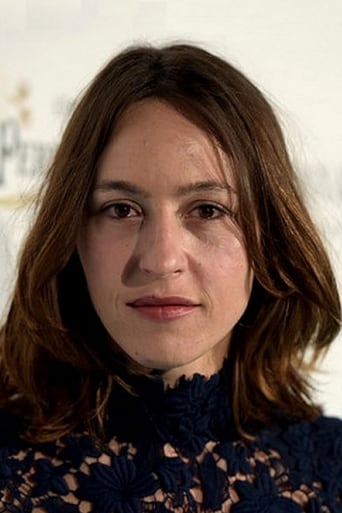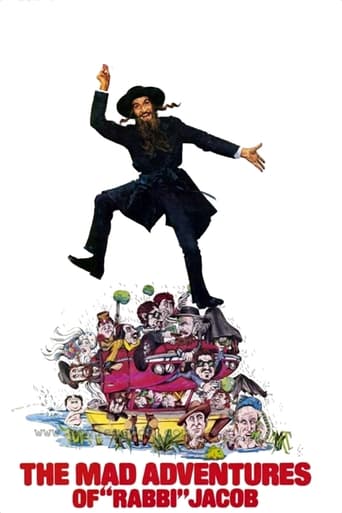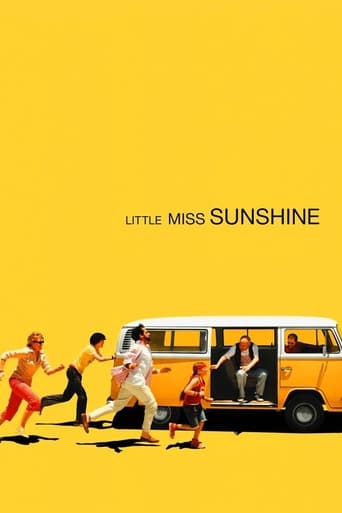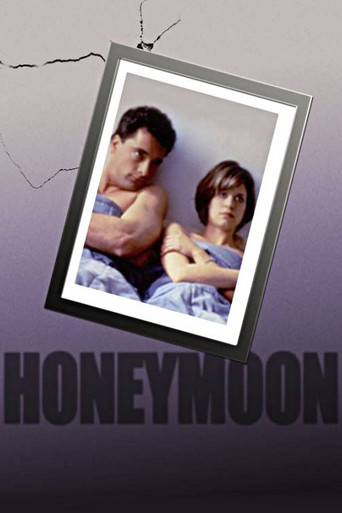Jellyfish (2007)
Meduzot (the Hebrew word for Jellyfish) tells the story of three very different Israeli women living in Tel Aviv whose intersecting stories weave an unlikely portrait of modern Israeli life. Batya, a catering waitress, takes in a young child apparently abandoned at a local beach. Batya is one of the servers at the wedding reception of Keren, a young bride who breaks her leg in trying to escape from a locked toilet stall, which ruins her chance at a romantic honeymoon in the Caribbean. One of the guests is Joy, a Philippine chore woman attending the event with her employer, and who doesn't speak any Hebrew (she communicates mainly in English), and who is guilt-ridden after having left her young son behind in the Philippines.
Watch Trailer
Cast


Similar titles
Reviews
I love this movie so much
Powerful
Good movie but grossly overrated
To all those who have watched it: I hope you enjoyed it as much as I do.
The movie has a multi-layered plot rich with symbolism. The elfin from the sea, who refuses to take off her float ring, is a jellyfish, which somehow symbolizes unfulfilled childhood wishes. The corporate strong woman, or politician, whose appearances on TV and posters punctuate the movie, laments nowadays parents fail to give their children anything. The main character Batya, while she was a child, had a deep craving for ice-cream while on the beach but the ice-cream man was turned away by her mother. The jellyfish elfin shows Batya a photo album with only one picture in it, and it is the ice-cream man on the beach, with a breeze blowing his shirt (as it moves on the photo). When the mysterious poetess, who has given up her suite to the honeymooners, commits suicide, the groom Michael finds a dead jellyfish under his feet on the beach. The jellyfish imagery is aquatic, as the poetess refers to a ship in the bottle, sealed up and not feeling any wind and thus stagnant. The Filipino domestic helper, Joy, wants to buy a large ship model for her son back home. When for the second time she gazes at the toy boat in the shop's display window, a magical effect appears: the little sails are fed by the wind, as if a real-life ship is on high sea—a little stirring of real life, like the ice-cream man's shirt catching a breeze in the photo? A third time in front of the shop, she finds it sold and becomes very much dejected, only to find it in her employer Malka's living room, meant as a gift to her. So, Joy is the only one that succeeds in giving her child something. The parent-child disappointment is not a one-way traffic, as Malka's daughter who hires the Filipino helper Joy to take care of her aging mother tries to win some acclaim to her performance in Hamlet, and all she gets from her mother is: "You lied on the floor half of the time, and uttering words that are not understandable even to people on stage!" At the end of the movie, the actress lady stares from the street resentfully through the window as her mother Malka embraces Joy inside the house.
"Poetic" is both literal and in the cinematic context. The film, part of it at least, takes such an airy, insubstantial, poetic flow. Towards the end, there is really a poem, echoing circumstances of unexpected pathos.This Israeli cinematic gem, because of its structure, is often compared to "Crash". Less known "Coeure" (2006) would have been an equally good comparison, as well as a few others. What makes Jellyfish unique however is that it does not go to the length of these other films in weaving a complex tapestry of the component stories. The three stories in Jellyfish are so casually linked that there may very well be no links. This is good. Over-complicated plots often distract from the essence of the stories, obscuring some of their beauty.Nor does Jellyfish pound the emotions of the audience the way many of these other films did. When the people in this film exhibit their emotions, they are nonchalantly low-key. Again, this is good. This leaves the audience more room to ponder and reflect, both during the film and afterwards.The "main" story, if there is one, evolves around a gentle, unassuming young women - vicissitudes and flawed relationships in that part of her life to which we are allowed a brief glimpse. This is also the most surreal of the three stories, because the interaction with a mysterious little girl who materializes out of the waves at the beach. This triggers shreds and patches that are open to interpretation, such as the young woman's reflection of her own childhood. A secondary character in this segment is another young woman, a photographer who befriends the protagonist and helps when the mysterious little girl goes missing.The second story, on the contrary, is solidly real. It evolves around a young Pilipino domestic helper in Tel Aviv, with as the key motif her telephone calls, usually in a street corner booth, to her 5-year-old child back home. The other two key characters in this segment are her employers, mother and daughter: an invalid and strong-headed old women and an actress who is so wrapped up with her theatre career to spend time caring for her mother.The final story starts with an accident during a wedding, when the bride's broken ankle wrecks the planned honeymoon cruise. In a crummy local hotel (albeit still at a beach) that is a most unsatisfactory substitute, a mysterious woman enters that part of the young couple's life, stirring disturbing undercurrents of emotion. It is from this mysterious woman, purportedly a writer, that the poetry comes.While I have left out a lot of details and other characters, it can be seen just from the much simplified synopsis what a great variety of emotional avenues the directors can tread down. It is to the credit of Shira Geffen and Etgar Keret that they resisted the temptation of going overboard with the material and wisely kept the film to 87 minutes. Going top-heavy into any of these emotional avenues would have ruined this film. They have wisely pass up a stormy symphony for a nonchalant tone poem. For that, they have been rewarded last year with the Cannes Camera d'Or for best first film.
Nikol Leidman is spectacular. Near the beginning of Meduzot, she plays a 5-year-old girl who walks out of the Mediterranean Sea onto a Tel Aviv beach wearing a flotation device around her waist. She may as well be naked. She doesn't speak but her wide-open and captivating eyes convey all that needs to be said.The girl befriends Batia, a 20-something woman with family problems, a job she hates, and a forgotten past. Social rules don't apply to Batia and the girl, as even the police don't place missing children on their list of priorities.One day, Batia literally runs into Joy, a Filipino woman who speaks English but is learning Hebrew while freelancing as a caregiver. Joy tries to help Malka recover from a hospital stay but Malka appears mean but that's only because of her relationship with her daughter. Nothing's what it seems.The hospital where Malka stayed is also where Keren was treated after she slammed her leg into the bathroom floor when trying to climb over a locked toilet stall on her wedding night. She and her new husband Michael stay at the famous Dan Hotel but the only beach-facing suite is taken by a mysterious woman who is writing a novel. Or is she? Walking out of the movie theater, I thought a lot about Meduzot and the translucent nature of jellyfish. The husband-and-wife filmmakers could have provided extra footage and explained more connections between the characters and put questions to rest with who the girl from the sea really is, but why spoil anything? I liked it fine the way it was.
This film is an elegant, simply told, and uplifting look at ordinary life. Although it relates the problems of the cast of main characters at different stages in their various lives, it does so with many small touches of humour, which lifts the mood along the way. Above all, expect a good, tight, literary script, which manages to weave together the disparate story lines to make a convincing whole. I saw this at the Dublin Film Festival, and I hope very strongly that it makes it to general release in Ireland and the UK. There are a lot of inferior art-house films which get distributed because they have big names behind them. However, Jellyfish, I think, shows you can have the serious and thoughtful, but in a lighter package.

